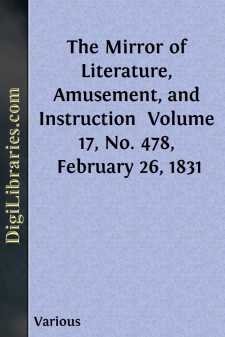Categories
- Antiques & Collectibles 13
- Architecture 36
- Art 48
- Bibles 22
- Biography & Autobiography 813
- Body, Mind & Spirit 142
- Business & Economics 28
- Children's Books 17
- Children's Fiction 14
- Computers 4
- Cooking 94
- Crafts & Hobbies 4
- Drama 346
- Education 46
- Family & Relationships 57
- Fiction 11829
- Games 19
- Gardening 17
- Health & Fitness 34
- History 1377
- House & Home 1
- Humor 147
- Juvenile Fiction 1873
- Juvenile Nonfiction 202
- Language Arts & Disciplines 88
- Law 16
- Literary Collections 686
- Literary Criticism 179
- Mathematics 13
- Medical 41
- Music 40
- Nature 179
- Non-Classifiable 1768
- Performing Arts 7
- Periodicals 1453
- Philosophy 64
- Photography 2
- Poetry 896
- Political Science 203
- Psychology 42
- Reference 154
- Religion 513
- Science 126
- Self-Help 84
- Social Science 81
- Sports & Recreation 34
- Study Aids 3
- Technology & Engineering 59
- Transportation 23
- Travel 463
- True Crime 29
The Mirror of Literature, Amusement, and Instruction Volume 17, No. 478, February 26, 1831
by: Various
Categories:
Description:
Excerpt
AUTOGRAPHS.
It is long since our pages were illustrated with such characteristic lineaments as those on the opposite page. The reader will, however, perceive that we have not entirely forgotten the quaint motto from Shenstone, in our earlier volumes—
"I want to see Mrs. Jago's handwriting, that I may judge of her temper."
Still the annexed Autographs have not been drawn from our own portfolio: they come "frae North," being selected from an engraved Plate of forty-three signatures, published with No. 28 of the Edinburgh Literary Journal, and prefixed to a pleasing chapter on "the connexion between character and handwriting"—from which we select only a few anecdotical traits.
ANNE GRANT: "We have given Mrs. Grant of Laggan's present hand, in which may be discovered a little of the instability of advancing life; but there is a well-rounded breadth and distinctness in the formation of the letters, which seems to carry along with it evidence of the clear and judicious mind of the talented authoress of 'Letters from the Mountains.'"
D. STEWART:—"General Stewart of Garth, a free, bold, military hand; his signature is taken from a letter complimenting in high terms Mr. Chambers's History of the Rebellion of 1745."
ALLAN CUNNINGHAM:—an easy flow of tasteful handwriting. "Allan Cunningham," observes the reviewer, "has raised himself like Hogg; but, instead of the plough, he has handled the chisel; and there is in his constitution an inherent love of the fine arts, which brings his thoughts into more grateful channels. We are well aware that there is a warmth and breadth of character about Cunningham which mark 'the large-soul'd Scot;' but looking forward to his forthcoming Lives of the British Painters, Sculptors, and Architects, we do not conceive this to be in the least inconsistent with the easy flow of his tasteful handwriting."
F. HEMANS: "the very hand—fair, small, and beautifully feminine—in which should be embodied her gentle breathings of household love, her songs of the domestic affections, and all her lays of silvery sweetness and soft-breathing tenderness."
F. LEVESON GOWER, the distinguished translator of Goëthe's Faust.
H. BROUGHAM: "a good deal like his own style of oratory—impressive and energetic, but not very polished." We question the last; but, be this as it may, polish is only desirable so long as it does not impair truth and utility. Plain-speaking has been the best rule of conduct for public men in all ages.
BASIL HALL: the observant traveller and very ingenious writer.
JOHN WILSON (the reputed editor of Blackwood's Magazine); and beneath, F. JEFFREY (late editor of the Edinburgh Review), who took his seat in Parliament not many days since.—"These are two names which stand at the head of the periodical literature of Scotland. The periodical writer must have a ready command of his pen and a versatile genius; he must be able to pass quickly from one subject to another; and instead of devoting himself to one continuous train of thought, he must have a mind whose quick perception and comprehensive grasp enable him to grapple with a thousand....












